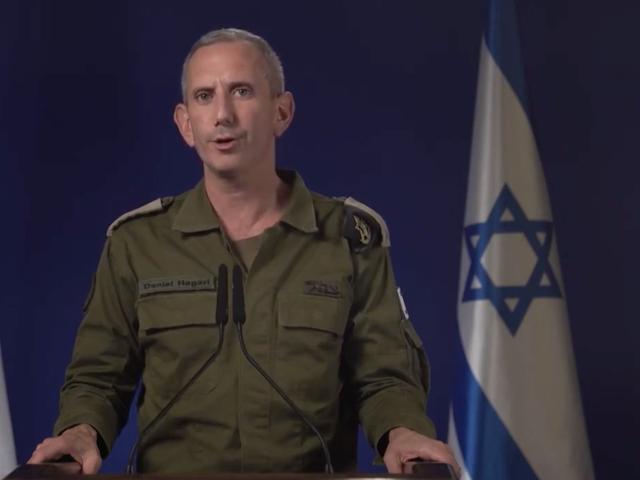In a candid and revealing interview, IDF Spokesman Rear Admiral Daniel Hagari made headlines on Wednesday by admitting that it would be impossible to completely eliminate Hamas. This bold statement has ignited a firestorm of tensions between Hagari, Prime Minister Benjamin Netanyahu, and top defense officials over the ongoing conflict in Gaza.
Hagari's Candid Admission
During an interview with Channel 13 news, Hagari did not mince words. "This business of destroying Hamas, making Hamas disappear — it’s simply throwing sand in the eyes of the public," he asserted. "Hamas is an idea, Hamas is a party. It’s rooted in the hearts of the people — anyone who thinks we can eliminate Hamas is wrong." His remarks underscore a fundamental challenge: Hamas is not just a military organization but also a deeply ingrained political entity and ideology within Palestinian society.
The Crux of the Argument
Hagari further warned, "If the government doesn’t find an alternative — [Hamas] will remain" in the Gaza Strip. When probed about whether the Palestinian Authority could replace Hamas, he deflected, stating that "the political echelon has to decide. Saying that it's possible to destroy Hamas and to make it disappear is to throw dust into the public's eyes." His comments suggest that without a viable alternative, any military victory over Hamas could be fleeting.
Prime Minister's Office Statement:
— Prime Minister of Israel (@IsraeliPM) June 19, 2024
The Security Cabinet, chaired by Prime Minister Benjamin Netanyahu, has defined the destruction of Hamas' military and governing capabilities as one of the goals of the war.
The IDF, of course, is committed to this.
Commitment to Target Hamas Leadership
Despite his stark assessment, Hagari committed to eliminating key figures within Hamas, particularly its leader Yahya Sinwar. "He will make a mistake and it will happen," Hagari vowed, indicating a focused effort on decapitating the group's leadership.
Netanyahu's Firm Response
In response, Prime Minister Netanyahu’s office issued a statement emphasizing the government's war goals. "The security cabinet has defined as one of the war goals the destruction of Hamas’s military and governance capabilities," it read. "The Israel Defense Forces is of course committed to this." This statement reaffirmed the government's stance and sought to reassure the public of the IDF's dedication to these objectives.
In a seeming split with Bibi, IDF spox Hagari says “The idea that it is possible to destroy Hamas, to make Hamas vanish, that is throwing sand in the eyes of the public … If we do not bring something else to Gaza, at the end of the day, we will get Hamas” https://t.co/ASXTz6dSYk
— John Hudson (@John_Hudson) June 19, 2024
Clarifications and Context
The IDF Spokesperson’s Unit subsequently clarified Hagari’s remarks, stressing that the military remains committed to the government's goals of dismantling Hamas’s military and governance structures. They added that Hagari’s comments about “eradicating Hamas as an ideology and an idea” had been misinterpreted and taken out of context.
Echoes of Previous Remarks
Hagari’s recent comments are not new. Last month, he addressed the challenges of reoccupying areas in Gaza previously cleared of Hamas, attributing this to the government's indecision on postwar governance. "There is no doubt that a governmental alternative to Hamas would create pressure on Hamas, but that is a question for the political echelon," he had stated.
Promise to "eradicate Hamas is misleading the public" Daniel Hagari, Israeli Army Spokesperson. 🔥
— UnCover (@uncoovr) June 20, 2024
🚨 “Hamas is an idea. Those who think it can be made to disappear are wrong,”
— Daniel Hagari on Channel 13.https://t.co/ohUzirqi6S pic.twitter.com/WmeP4swV8O
Defense Minister Gallant's Warning
Defense Minister Yoav Gallant has consistently urged Netanyahu to devise a postwar plan for Gaza's governance. In May, he warned that failing to find a replacement for Hamas would undermine Israel’s military successes, allowing the group to regroup and reclaim control. Gallant has also advised against any Israeli military or civil rule in Gaza, countering some far-right members of Netanyahu’s coalition who advocate for such measures.
Internal Frictions and Strategic Disagreements
Reports have highlighted ongoing frictions between Netanyahu and other military leaders, including IDF Chief of Staff Herzi Halevi and Shin Bet head Ronen Bar, particularly over strategic planning. National Unity leader Benny Gantz’s recent resignation from the emergency war government over Netanyahu’s refusal to present a postwar plan further underscores these internal tensions.
Senior #Hamas officials are making propaganda use of the words of the #IDF spokesman yesterday regarding Hamas
— AbuAliEnglish (@AbuAliEnglishB1) June 20, 2024
Here are the things that senior Hamas official Ghazi Hamed said last night:
Hagari's statements are a significant admission and proof of the failure of the (1/3) pic.twitter.com/j1w7h4rlfx
Controversy Over Tactical Decisions
The recent dispute over "tactical pauses" in fighting along a road in southern Gaza, which Netanyahu criticized, reveals another layer of tension. While Netanyahu chastised the move, the IDF maintained it was in line with his instructions to facilitate more aid into Gaza. Netanyahu’s pointed comment during a cabinet meeting — "we have a state with an army, not an army with a state" — further exemplified his growing impatience with the military leadership.
A Family Feud
Adding to the controversy, Netanyahu’s eldest son Yair has increasingly attacked army leaders, blaming them for the October 7 massacre. Unlike the defense brass, the Prime Minister has repeatedly refused to acknowledge any responsibility for the incident.
@IDFSpokesperson Rear Admiral Daniel Hagari told Ch13 that “Hamas is an idea” and that as such “anyone who thinks it can be eliminated is wrong.” https://t.co/zVrH0VLPoX
— Jewish News Syndicate (@JNS_org) June 20, 2024
Conclusion
Rear Admiral Hagari’s forthright comments have brought to light the complex and often contentious dynamics between Israel’s political and military leadership. As the conflict with Hamas continues, these internal disputes highlight the significant challenges Israel faces in both its military operations and in planning for Gaza’s future governance.


